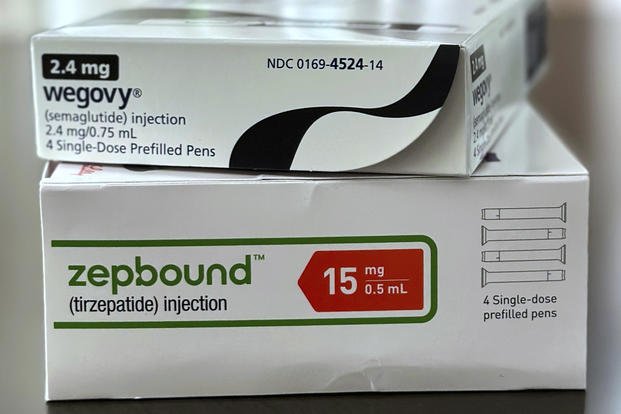Military retirees and family members on Tricare for Life, and civilians with access to military hospitals and clinics, will lose coverage for weight loss drugs like Wegovy and Zepbound starting Aug. 31, according to the Defense Health Agency.
Military health officials said earlier this month that Medicare-eligible retirees — those who use Tricare for Life — and Defense Department civilians and others with access to military hospitals but who aren’t on Tricare will no longer be able to get these popular medications through the DoD health system.
Beneficiaries with Tricare Prime, Tricare Select and premium-based Tricare plans will continue to have coverage, but they must meet certain clinical criteria, such as being obese or having obstructive sleep apnea related to their weight, according to the Defense Health Agency.
Read Next: Cancer in Military Pilots and Aircrews Will Be Studied Under Newly Signed Law
Tricare for Life, or TFL, provides secondary health coverage to military retirees and their family members on Medicare. As wraparound coverage, TFL was covering those medications, known as glucagon-like peptide-1, or GLP-1, agonists for weight loss in eligible beneficiaries.
But Medicare covers GLP-1 medications only to treat Type 2 diabetes and for cardiovascular disease that may be worsened by a patient’s excess weight. It does not cover the drugs prescribed specifically for obesity.
Tricare for Life beneficiaries prescribed these medications for diabetes will retain coverage, according to the Defense Department. Common GLP-1 drugs for diabetes include Ozempic and Mounjaro.
Last December, the Biden administration published an interim rule to allow Medicare and Medicaid to cover GLP-1 agonists for weight loss. The anticipated cost of the coverage for the federal government of the change was $48 billion over 10 years, according to a University of Chicago estimate.
The Trump administration issued its final rule on 2026 Medicare drug coverage in April and excluded the interim rule’s provision that would have allowed coverage of GLP-1 medications for weight loss.
Tricare officials said the Defense Health Agency is eliminating coverage for its Tricare for Life beneficiaries and others to “align with federal coverage requirements.”
“Your provider can work with you to explore all options and determine the best approach for your health needs,” Tricare officials said in a news release. “Talk to your provider. You can also visit Health and Wellness for more details on resources that can help you reach your goals.”
GLP-1 medications have been used to treat diabetes for nearly 20 years. They mimic a hormone that is naturally released by the body after eating, triggering the release of insulin from the pancreas, controlling blood sugar levels.
The medications also suppress hunger and slow the digestion process, leading patients to feel full on smaller portions or for longer periods of time after eating.
While patients report weight loss and often improvement in mental health and cognition, these medications can have side effects that include nausea and vomiting, muscle loss and sagging skin.
The Defense Department has not released an exact accounting of the number of GLP-1 prescriptions written for weight loss, but a 2024 report noted that, by late 2023, the drugs made up roughly one-third of all prescription weight-loss medications for active-duty military personnel.
According to the report, 67.3% of active-duty troops were overweight in 2021, with 18.8% of those service members considered clinically obese.
The DoD began including weight-loss drugs in Tricare’s formulary in 2018, adding semaglutide, a type of GLP-1 agonist, in 2021.
The out-of-pocket costs for such medications run between $350 and $500 per month, according to the manufacturers.
The Department of Veterans Affairs covers the medications for weight loss for veterans who already have tried less-pricey medications without success; those who also participate in a whole-health approach, including lifestyle modifications and exercise; and those with a body-mass index of 27 or more with at least one weight-related condition or illness; or a BMI of 30 or more.
The Defense Health Agency said beneficiaries affected by the change in coverage will be notified by mail.
“People are taking GLP-1 drugs — like Wegovy and Zepbound — for weight loss now more than ever,” Defense Health Agency Chief Medical Officer Dr. Paul Cordts said in a statement. “It’s important to understand how — and why — Tricare covers these drugs, based on your condition and status.”
Related: Vets Say Weight Loss Drugs Have Improved Their Health, But New Patients Are Out of Luck
Story Continues
Read the full article here

